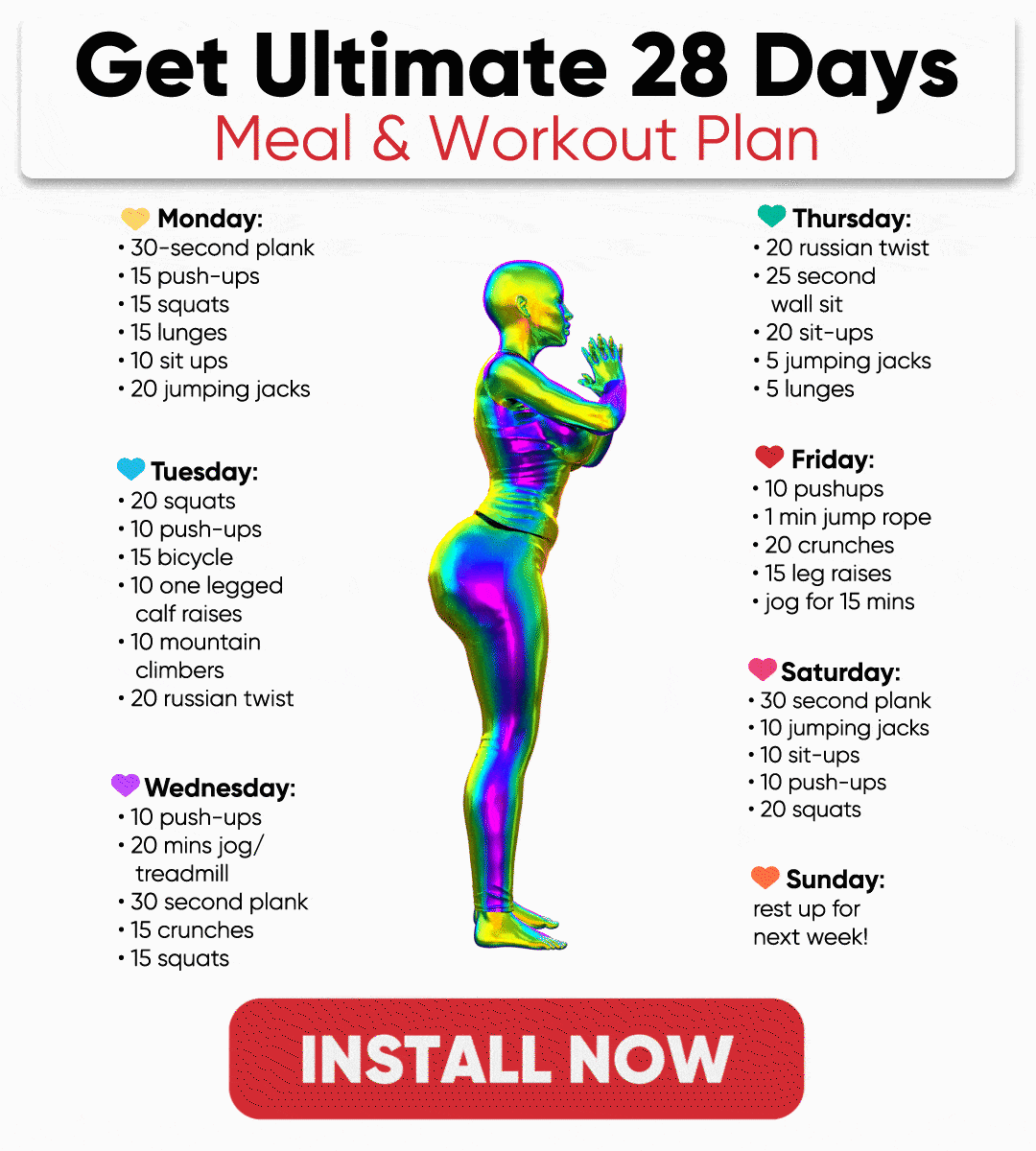
Calorie Deficit But Not Losing Weight
There are dozens of different weight loss methods out there. Whether they are workouts or nutrition plans, they all promise to help you reach your body goals. However, there is almost no way of knowing whether this or that method will work for you personally without consulting your doctor and trying it out yourself. Besides that, not all the methods that you can find online are safe or effective. There are numerous fad diets that can only harm your health and bring a very short-term result if any result at all. That is why you should stick to evidence-based methods of weight loss. Being on a caloric deficit is one of the tried and true ways to lose weight. Many experts and doctors will tell you that the first step to shedding a couple of extra pounds is to cut down on how much you eat and aim to burn more calories than you consume. However, what happens if you are on a calorie deficit but not losing weight? What could be the cause of this confusing and frustrating conundrum?
Calorie Deficit To Lose Weight: Is It Important?
First things first, let’s determine what exactly a calorie deficit is. A calorie deficit is when you consume fewer calories than you burn. It is created with the help of a diet that restricts the amount of consumed food and as so calories, and regular exercise which helps you burn more calories than you usually do. Now, is calorie deficit that important in weight management? Yes, it is. To lose weight, you must create an energy deficit (aka calorie deficit). Months or years of consuming more calories than needed to maintain your weight leads to weight gain. To reverse this, you need to eat less, making the body use stored fat as energy which leads to weight loss (2).
1,000 Calorie Deficit Daily But Not Losing Weight
A calorie deficit can be different. You can slightly reduce your caloric intake, making very small steps towards your goal on this weight loss journey; you can create an adequate caloric deficit which will reward you with safe, gradual, and sustainable results; or you can extremely cut your calorie intake, which will result in rapid weight loss and may be accompanied by various health issues, such as nutrient deficiencies, dehydration, gallstones, nausea, headaches, constipation, hair loss, muscle loss, and others. Luckily, most of us know that in order to lose weight, we must be in a 500 to 1,000 calorie deficit a day. This allows us to slowly start losing the unwanted pounds. However, sometimes even after carefully tracking your meals and snacks, you may find that you are not seeing the weight loss results that you would like to see. What could be the problem? Here are the main reasons why you may be on a calorie deficit but not losing weight:
Read More: No Matter What I Do I Can’t Lose Weight: True Reasons Your Scale Won’t Budge And Viable Solutions
Increased Stress Levels
One of the most common reasons for being on a calorie deficit but not losing weight is an increased stress level. Whether it is caused by problems at work, toxic home environment, nagging neighbors, or rude waiters, stress is never a pleasant experience. But did you know that besides making you upset and tired, stress can hinder your weight loss progress? While you might be doing all the right things, i.e. eating well and exercising; excessive or chronic stress levels may hinder your weight loss. When you are always stressed, your body tends to produce cortisol at a much higher level than normal. Cortisol, aka ‘the stress hormone’ is one of the body’s steroid hormones and is made in the adrenal glands (21).
Abnormally high levels of this hormone due to pituitary or adrenal tumors cause Cushing syndrome which triggers rapid weight gain in the face, abdomen, and chest. Even in healthy individuals, cortisol plays a role in how your body uses carbohydrates, fats, and proteins, thus, chronically elevated cortisol levels due to stress may lead the body to turn food into stored fat instead of changing it into energy (22).

How To Fight It?
Now that you know how harmful stress is, it is time to figure out how to fight it. One of the best methods to reduce your stress levels is to avoid the things that trigger it. If it is impossible, don’t despair, as there are other methods that can help you do it. Such as:
Get Enough Shut-Eye
You may have noticed how when you wake up after a bad dream, or when you sleep too little, you feel irritated, tired, and stressed. Sleep and stress are interconnected. Lack of sleep can cause increased stress levels and lots of stress may result in problems with sleep. If you have difficulties falling asleep, set a sleep schedule, drink less alcohol and caffeine in the evening, keep away from your electronic devices an hour before bed, and spend more time in the sun during the day.
Adjust Your Diet
You are what you eat. A healthy diet will not only promote weight loss and overall better wellness but can also improve your mental health. It can help reduce your stress levels, boost your immunity, improve your mood and lower your blood pressure. In order to successfully fight stress, reduce your consumption of added sugar and fat, and instead eat more complex carbs, lean proteins, and healthy fats. Antioxidants can also be of great help here. Some of the best nutrients to reduce stress levels include vitamin C, magnesium, and Omega-3 fatty acid.
Increase Your Physical Activity
Exercise is overall beneficial for your body and mind. Besides improving your sleep, it can also boost your mood, which are two major factors in fighting against stress. Working out stimulates your body to release endorphins and endocannabinoids – hormones that sedate you, help block pain, and improve sleep. If you have some free time, try running, swimming, cycling, aerobics or dancing. And if you have an extremely busy day, and don’t have time for a full workout, try to increase your physical activity here and there throughout the day. For example, use the stairs instead of an elevator, take a walk during your lunch break, park as far as you can from the door, etc.

Test Out Relaxation Techniques
There are numerous relaxation techniques that can help you fight your problem. One of them is meditation, which is famous for its stress-reducing qualities. You don’t need to have any special skills or use any special equipment to try this relaxation technique. It can be performed anywhere and by anyone. There are various types of meditation, so you are sure to find at least one that will work the best for you. It also doesn’t take much time – even a daily 5-minute meditation will bring significant results. All you need is to feel comfortable and breathe deeply.
Yoga is also an effective relaxation technique. It is a combination of exercise and meditation, so it can work miracles at helping you fight stress. You can go to a yoga studio or perform yoga at home. Another great option is to do yoga outdoors, since spending time in the sun and in the fresh air boosts your mood. Make sure that the weather is warm, and you are dressed according to the temperature to avoid catching a cold.
If you don’t like either of the two above-presented methods, you can try performing relaxation breathing techniques. Like meditation, they require no specific skills or equipment and don’t take much time. One of the relaxation breathing techniques is deep breathing. It can help you relax and change how your body responds to stress. It also provides your brain with more oxygen. To try deep breathing, get in a comfortable position and close your eyes. Place your right hand on your stomach and your left hand on your chest. Inhale deeply through your nose, allowing your belly to rise to a higher level than your chest. Now, slowly breathe out through your nose and feel how your body relaxes. Repeat for 2-3 minutes.
Your Weight Has Plateaued
Once you begin cutting calories, your weight will drop very quickly, but sooner or later, this process slows down and eventually stops. This is called a weight loss plateau. The initial weight loss is usually just water weight and not fat loss. The plateau is caused by loss of muscle that occurs during weight loss (if you are not working out).
To counter this, you can either cut more calories or increase your physical activity. While cutting calories sounds like the easier option, we advise that you start working out. Cutting calories may lead to under-eating or being on a very low-calorie diet, which, in itself, brings on a slew of multiple health risks (8). Exercise can also help you preserve muscle and therefore lose mostly fat.
Slow Metabolism
You have probably already heard that your weight loss pace depends on your metabolism. People with slow metabolism often find it more difficult to lose weight compared to people with a fast metabolism. But why is that so? Metabolism or metabolic rate is defined as the series of chemical reactions in a living organism that create and break down energy necessary for life. In layman terms, metabolism is the process by which your body converts food and drink into energy (11).
Anyone with a fast metabolism is able to burn more calories when working out and even when resting, whereas someone with a slow metabolism burns fewer calories at rest and during exercise. To counter this, those with a slow metabolism tend to eat less by cutting calories (7).
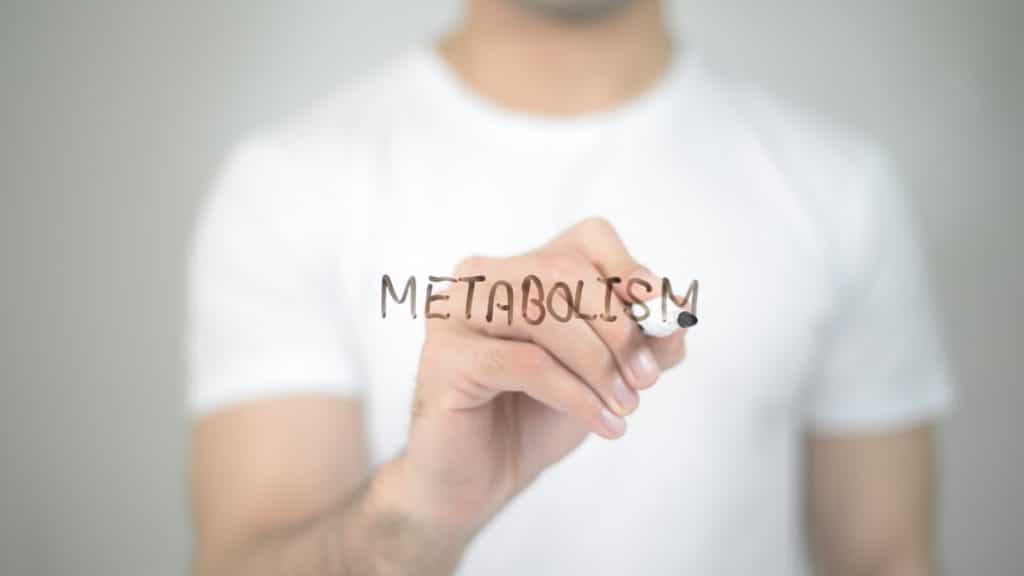
However, sometimes cutting calories can slow down your metabolism causing weight gain or a weight loss plateau due to loss of muscle. To try speed up your metabolism you should:
- Drink more water as your body needs it to help burn calories (16).
- Do more high-intensity cardio. This results in a longer rise in resting metabolic rate hours after your workout.
- Aim to build muscle. A pound of muscle requires 6 calories a day to sustain itself while the same amount of fat only requires 2 calories.
- Try eating every 3 to 4 hours, but make sure that your meals and snacks are healthy. Fatty, salty and unhealthy foods will just do the opposite and make you gain weight.
- Eat more protein as the body burns more calories in the efforts to burn proteins as compared to either fats or carbs.
- Drink more coffee, teas such as oolong and green tea, and try eating spicier foods. These boost your metabolism, albeit for a short period of time. However, keep an eye on your coffee, and tea intake as too much caffeine is also not good for you.
You Are Not Sleeping Enough
When was the last time you got a full eight hours of uninterrupted sleep each night for a whole week? Sleep deprivation and bad sleep patterns also may prevent weight loss despite a calorie deficit. Adults require at least seven hours of uninterrupted sleep every night; however, many do not often get this.
A study done in 2017 showed that persons on a weight loss program with high sleep variability lost less weight and experienced less of a reduction in BMI (body mass index) than those with a regular sleep pattern (12). If you are looking to reduce your waistline, you might also consider sleeping for seven to nine hours each night.
It should be noted that even when you do not reduce your food intake but sleep more, you are likely to lose weight, while less sleep, even on a calorie deficit, prompts the release of cortisol which in turn tells your body to hold on to fat (15).
BetterMe app will kick you out of the mental funk, shake off your extra weight, rid you off you energy-zapping habits, and help you sculpt the body of your dreams. Intrigued? Hurry up and change your life for the better!
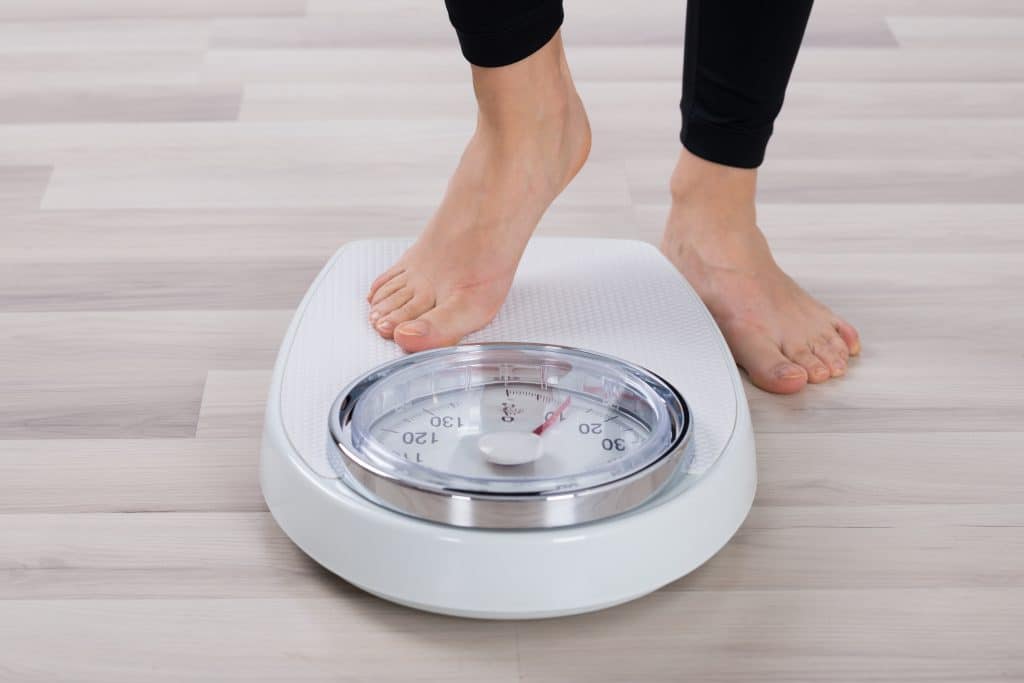
Your Weighing Scale Is Lying To You
Most if not all of us, have a weighing scale in the bathroom. However, these scales are not as accurate as you might think. Something as small as moving the scale from one surface to another can affect the number on it.
Also, it is recommended that if you choose to use a bathroom scale, make sure that it is calibrated and always measure yourself at a specific time of the day as it reduces the margin or error in weight shifts (5).
Water Weight
As initially stated above, your body loses water weight before losing any fat. However, sometimes water retention can be caused by other aspects that can be the reason behind calorie deficit but not losing weight. Salty food, high carbohydrate intake, lack of exercise and some medications can cause water weight gain even on a caloric deficit (10).

Muscle Growth And Increased Bone Density
For a beginner, eating on a calorie deficit while working out (cardio and weight training) causes both fat loss and muscle growth (4). While fat and muscle weigh the same, the latter tends to occupy less space. On the other hand, working out also increases bone density (18). These two factors can affect the number on the scale, making you believe that you are on a calorie deficit but not losing weight.
Polycystic Ovary Syndrome
Women battling PCOS find it extremely hard to lose weight. Due to this illness, their bodies tend to produce too much insulin and have imbalanced levels of ghrelin, cholecystokinin, and leptin (hunger and satiety hormones).
These factors not only make it harder to lose weight even on a calorie deficit – too much insulin causes the body to hold on to fat – while the other hormones make it hard to stay on a deficit (25).
Read More: How To Lose Weight With PCOS: 5 Easy Dietary Tweaks

Numerous Hormonal Changes In Women
During your period, your appetite changes, making you crave sugary and high-calorie foods which may affect your calorie deficit. On the other hand, even if you maintained a 1000 calorie deficit during this time, hormonal changes could cause water retention. If you weigh yourself during this time, chances are that you will start thinking that your diet is not working (19).
Menopause
Calorie deficit but not losing weight during and after menopause is a common occurrence in women. Worse, many tend to gain weight even after cutting down on food intake and working out. If you are going through this, it is advisable to do more high-intensity workouts, incorporate weights and strength training and try addressing sleep issues that come with menopause (26).
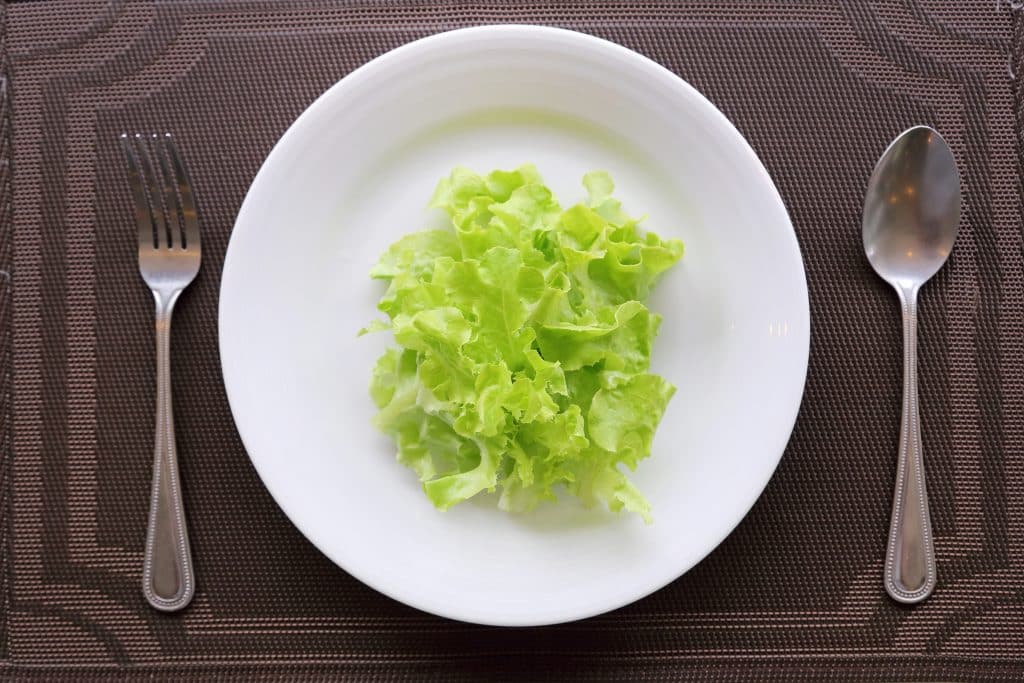
Exercising And Calorie Deficit But Not Losing Weight
Imagine killing yourself at the gym five days a week, eating less than you did before, but the scale does not budge, or worse the numbers just keep going up. To most people trying to lose weight, this would be an actual living nightmare. It is even worse if this is your current situation, and you cannot understand why. Here are some reasons why the scale might not be showing what you would like it to:
You Are Eating Too Little
The problem with some of us is that we think going on a calorie deficit means starving ourselves by eating the bare minimum. This is not only not the meaning of a deficit, but it can also be life-threatening.
When you eat too little, your body assumes that you are starving and goes into ‘starvation mode’. Here, your body will try saving itself, and you by holding on to fat. Your metabolism slows down, and you lose muscle, making you burn fewer calories at rest (3).
If you are experiencing symptoms such as fatigue, decreased immunity, hair loss, constipation and depression, and you are on a deficit, then you might be under-eating. Failure to stop this may cause even worse issues such as malnutrition, infertility and osteoporosis, among others (20).
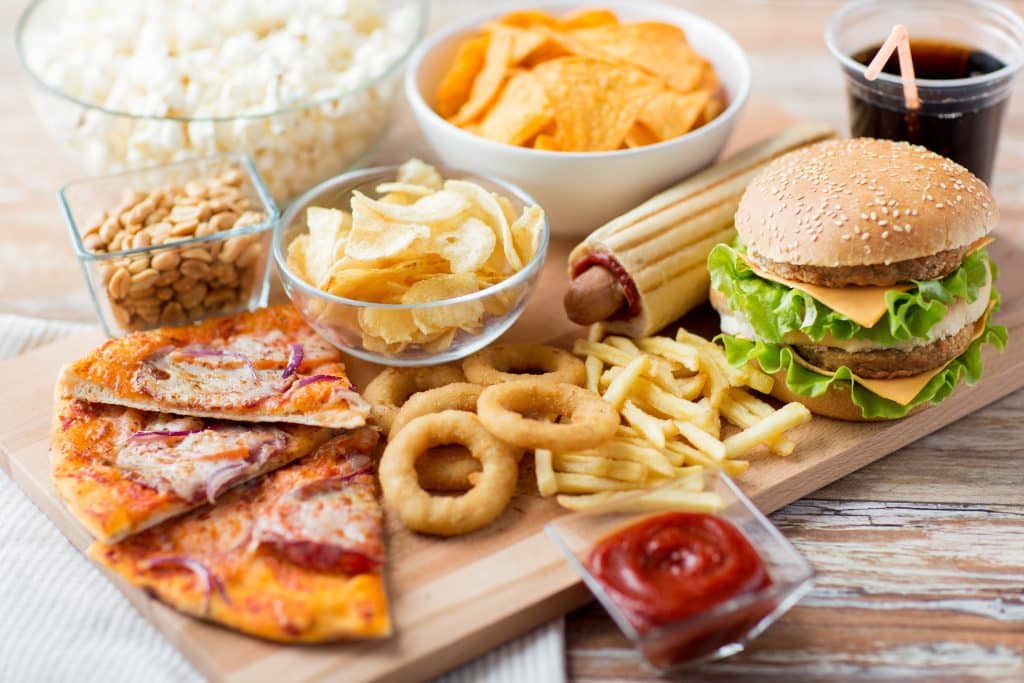
You Are Consuming The Wrong Foods
Calorie deficit but not losing weight could also be linked to the kinds of food consumed. A huge part of healthy living and weight loss comes from the amounts and types of food that you eat on a daily basis. Being on a caloric deficit does not mean that you can keep eating pizza, white bread, insane amounts of cheese, sodas, and burgers every day, but they won’t derail your progress if consumed in smaller amounts.
Weight loss and healthy living is a lifestyle that requires sacrifice and dedication. Instead of all these foods, swap them out for healthier options such as leafy greens, fruits, complex carbs (oats, sweet potatoes and whole grains), lean meats, legumes and oily fish. Remember that even after switching to healthier food options, you should maintain a calorie deficit and keep working out for effective and sustainable weight loss.
Not Lifting Weights
Many people believe that for you to lose weight, you need to do as much cardio and aerobic exercises as you can. This is not wrong because such workouts burn a lot of calories. However, weight and strength training is also quite important. These workouts are linked to increased muscle mass which, as discussed above, helps in burning calories. More muscle means a higher metabolism (17), which equals weight loss.
Lean and toned up body isn’t just a far-fetched fantasy. Check out the BetterMe app and watch it propel your weight loss journey into high gear!

You Are Doing Too Much Cardio
Yes, cardio is important, and yes, too much cardio is bad. Working out for too long on cardio workouts sends your body into a catabolic state. During this state, the body tends to use complex compounds and body tissue, like muscle, as fuel.
As previously stated, muscle is very essential in calorie burning and weight loss. Catabolism also triggers hormones such as cortisol and glucagon (1), which raise levels of glucose and fatty acids in the body.
Other factors related to exercising but not losing weight include lack of enough sleep, being under too much stress, weight plateau and hormonal issues in women.
The Bottom Line
Losing weight is something that most of us struggle with, so the last thing anyone needs to do is beat themselves up for not seeing results. Being on a calorie deficit but not losing weight makes it even worse. However, instead of taking drastic measures – like giving up or eating less – take a minute and examine what factors might be causing this.
Watch your water intake, stress levels and sleep patterns, exercise habits (how much cardio and weight lifting do you do), and overall eating habits and food choices. For women, observe what is going on with your body, are you on your period, going through menopause or could it be something more complicated like PCOS.
The reasons behind being on a calorie deficit are endless. If you cannot narrow down a specific reason, talk to your doctor and s/he might be able to help you out. Also, remember that you must always talk to your doctor before cutting your calories or exercising, especially if you have a chronic illness.
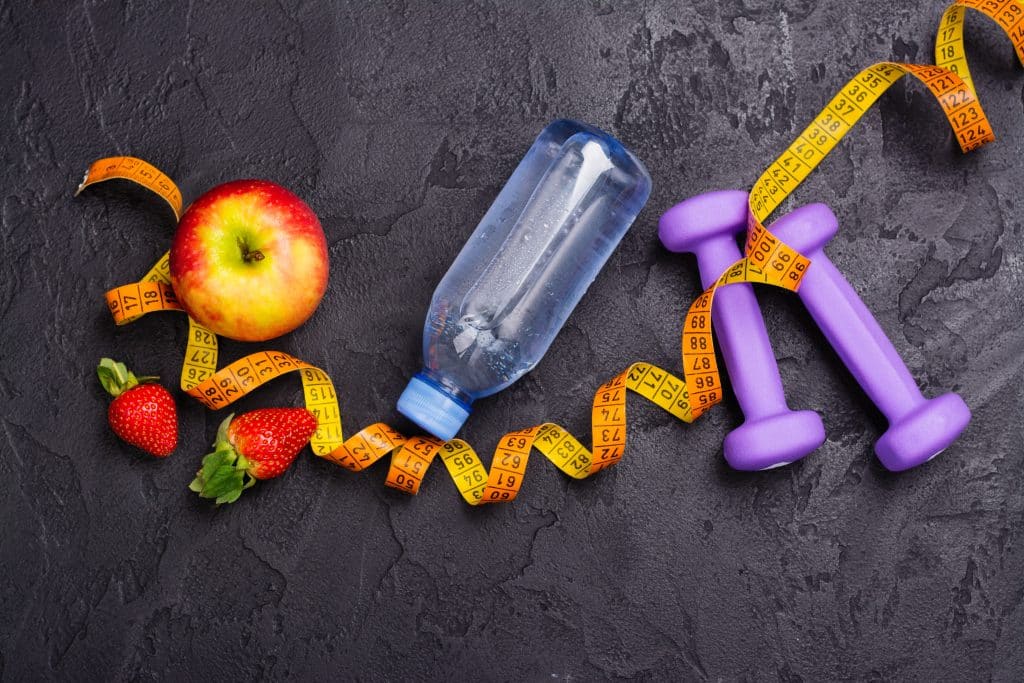
FAQs
When You Think You’re In A Calorie Deficit But Not Losing Weight?
If you believe that you are on a caloric deficit but are not seeing results, then it might be time to observe what you are eating carefully. The best way to do this is to create a food journal or get a reputable app to help you log in your daily calories.
After all, since most of us do not automatically know how much calories is in what, you just might realize that you have been eating more than you think you are. If this is not the case, then the answer might be in any of the above-outlined reasons.
What Should My Calorie Deficit Be?
Before knowing what your calorie deficit should be, you must first determine how much calories you consume per day. This can be easily done by downloading a highly rated calorie app from your app or play store.
Once you have done this, eat as you would on a daily basis and log in everything on the app. This will give you a good estimate of your daily intake. After this, you should realize that for healthy and sustainable weight loss, you should be on a calorie deficit of 500 to 1000 calories a day (3,500 to 7,000 energy deficit a week).
This will help you lose 1 to 2 pounds a week (6). A calorie deficit is also determined by age and the amount of physical activity done in a day. The less active you are, the less you eat. Input all these details into your calorie counter, and you will know what your deficit should be.

What Is A Good Calorie Deficit For Weight Loss?
A good energy deficit for weight loss is cutting anywhere between 500 to 1000 cals a day. While you might be tempted to cut more, it is not worth it as it leads to nutrient deficiencies, heart and digestive problems (14) and may even cause eating disorders (13).
How Much Of A Calorie Deficit Is Too Much?
Cutting anything more than 1000 calories a day is considered too much. However, the least amount of calories that should be consumed in a day are (23):
- Women – 1000 to 1200 cals
- Men – 1,200 to 1,600 cals
However, since calorie intake depends on many factors, it is always a good idea to speak to your doctor before cutting your calories, working out or starting any kind of weight loss program.
How To Create A Calorie Deficit?
Creating a calorie deficit for weight loss is quite easy. Here is what you would need to do:
Consume Less Food
As stated above, logging your food will give you an idea of how much food you consume a day. With this number, cut anything from 500 to 1000 calories, and you will effectively be in a deficit. Replace your foods with healthier and low-dense calorie options.
Portion control is also quite essential. Reduce the number of times you eat or order out, use smaller plates at home, and stop eating in front of the TV or computer (9).
While cutting calories promotes weight loss more effectively than working out, exercise helps you keep the weight off (24). Without working out, you are bound to gain all the excess weight back after you are done dieting. Check out this 20-min Full Body Workout at Home.

DISCLAIMER:
This article is intended for general informational purposes only and does not address individual circumstances. It is not a substitute for professional advice or help and should not be relied on to make decisions of any kind. A licensed physician should be consulted for diagnosis and treatment of any medical conditions. Any action you take upon the information presented in this article is strictly at your own risk and responsibility!
SOURCES:
- Anabolic and Catabolic in Weight Training (2020, verywellfit.com)
- Calorie Deficit for Losing Weight (2020, verywellfit.com)
- Can Eating Too Few Calories Prevent Weight Loss? (2019, livestrong.com)
- Can I Lose Fat and Gain Muscle at the Same Time? (2019, verywellfit.com)
- Can I Trust My Bathroom Scale? (2018, nytimes.com)
- Counting calories: Get back to weight-loss basics (2020, mayoclinic.org)
- Does Metabolism Matter in Weight Loss? (2015, health.harvard.edu)
- Getting past a weight-loss plateau (2020, mayoclinic.org)
- How to Avoid Portion Size Pitfalls to Help Manage Your Weight(2015, cdc.gov)
- How to lose water weight naturally (2018, medicalnewstoday.com)
- Metabolism and weight loss: How you burn calories (2017, mayoclinic.org)
- Poor sleep may hinder weight loss, study shows (2019, medicalnewstoday.com)
- Risks of Not Eating Enough Calories (n.d, livestrong.com)
- Side Effects of Not Eating Enough Calories (n.d, livestrong.com)
- Sleep More, Weigh Less (2020, webmd.com)
- Slideshow: 10 Ways to Boost Your Metabolism (2019, webmd.com)
- Slow Metabolism | 8 Things that Slow Down Your Metabolism(2016, acefitness.org)
- The Link Between Exercise and Healthy Bones (2019, verywellfit.com)
- Weight gain during period: What to know (2019, medicalnewstoday.com)
- What are the signs of not eating enough? (2019, medicalnewstoday.com)
- What is Cortisol? (2018, hormone.org)
- What Is Cortisol? (2018, webmd.com)
- What Is the Least Amount of Calories I Can Eat in a Day? (n.d, livestrong.com)
- Which is better for weight loss — cutting calories or increasing exercise? (2020, mayoclinic.org)
- Why It’s So Hard to Lose Weight With PCOS (2019, verywellhealth.com)
- Winning the weight battle after menopause (2019, health.harvard.edu)
Discover more from ReviewFitHealth.com
Subscribe to get the latest posts sent to your email.
